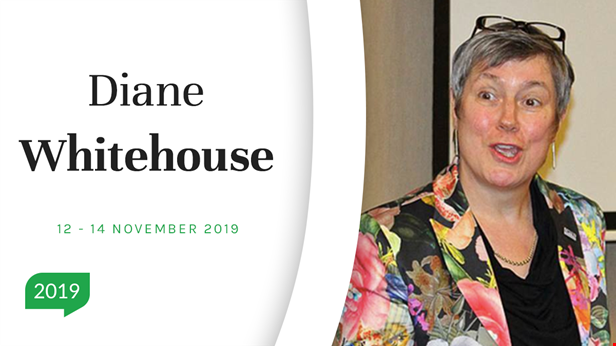[EPF Congress] Interview with Diane Whitehouse

We asked Diane Whitehouse, Principal eHealth Policy Analyst in EHTEL (the European Health Telematics Association) her thoughts on the Congress, and what made her become one of our ambassadors. Here is what she told us!
What made you agree to become an Ambassador to our Congress?
The EPF Congress theme makes absolute sense to me. It’s clear that the next decade will enable people to focus much more on our own health and care and how we manage this two integrated aspects of our lives. Gathering together in forums to debate these issues really helps. I work for EHTEL, and we’ve had a longstanding and positive relationship with EPF for many years. So, contributing to this Congress in an ambassadorial role was something we were in total agreement on.
In what ways do you think increasing patient involvement can help make the system work better/more effectively/efficiently?
It’s impossible to have good health and care without involving the people whose bodies and minds are at stake. Today there’s an increasing focus on the impact that looking after one’s own health can have for individuals. We’ve lost sight, however, of people’s need to be engaged in how their communities, cities, societies, health and care systems, nations, continents and the globe itself remain and become more healthy (i.e., good, clean [“environmentally sound”] and fair health and care[1]). While policy-makers and industry are concentrating increasingly on the use of our data, we also need to start re-generating enthusiasm for people’s actual involvement, engagement, and activity in a healthy society!
Are there any unanswered questions in the field of health and patient-care that the Congress can help provide answers or progress on?
The Congress’s commitment to meaningfulness could be really insightful (it’s an important theme too for EHTEL members). One example is in terms of EHTEL’s stance on citizens’ empowerment and online access to health and care data.
The Congress goes in some very interesting directions on: the proactive involvement of patients’ representatives; patients acting and working as “teachers”; meaningful engagement with patients in other countries e.g., in the United States’ National Health Council. It will be really interesting to hear what this group of patients thinks about what will make “more effective” health systems, for themselves and for other stakeholders.
Truly unanswered questions for me are around future aspects of “the management of the self” and “transhumanism” (what happens when we are “wired” and “tracked”, even if the ultimate outcome is intended to improve health and care?)[1]. Maybe some pointers to these questions will emerge either in the hackathon session or the digital health session?
You are also moderating one of your parallel sessions: Could you tell us more about your involvement in the field of digital health?
EHTEL has worked for 20 years on digital health. I’ve been involved in the field for about the same length of time. Key to digital health today is to consider three main developments: research, innovation, and implementation. For this reason, I would already encourage people and patients to get involved in examining how Horizon Europe and the Digital Europe Programme will shape up! To give thought to how health and care will develop over the next decade will act as good preparation for the EPF Congress, and other 2019 events like the EHTEL Symposium.
What are your expected outcomes of the session?
I expect a lot of sharing of experiences, from a whole range of people whether young (e.g., the EPF Youth Group) to people who have longer involvements in the field. We’re likely to learn a lot about opportunities, and yet challenges, that digital health can bring. I get the impression that we’ll hear about plenty of good practices and come away with a lot of evidence. This should help us all, whether we are patients or simply people interested in health and care, to enhance and expand good digital health.
[1] These ideas were briefly explored in a book co-edited with Magda ROSENMOELLER and Petra WILSON in 2014, which paid tribute to the foundational, digital health initiatives of Professor Jean-Claude HEALY: https://www.palgrave.com/gp/book/9781137379429
[1] “good, clean, and fair” are three concepts draw from a book on information technology co-authored with Norberto PATRIGNANI of the Politecnico di Torino in 2018: https://www.palgrave.com/gp/book/9783319689432
